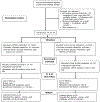Steps to Effective Problem-Solving in group homes
- PMID: 30031089
- PMCID: PMC9636718
- DOI: 10.1016/j.cct.2018.07.011
Steps to Effective Problem-Solving in group homes
Abstract
Aggressive/challenging behaviors (A/CB) are a major public health problem for individuals with intellectual disabilities (ID). A leading reason for psychiatric hospitalizations and incarcerations, such behaviors are costly to the health care system, agencies, and families. Social problem-solving (SPS) training programs for individuals with ID have had positive behavioral results, but most were conducted in clinical or forensic settings. None was a community-based preventive intervention, none examined whether the behaviors decreased in residential and work settings, and none addressed cost-effectiveness. In preliminary work, we modified an effective SPS training program (ADAPT: Attitude, Define, Alternatives, Predict, and Try out), using input from individuals with ID and residential staff, as a community-based preventive intervention that we delivered in group homes (STEPS: Steps to Effective Problem-solving). Individuals with ID have high rates of obesity, and our attention-control condition is a nutrition intervention: Food for Life. We describe the protocol for a randomized clinical trial to: (1) test the efficacy of the STEPS intervention for improving SPS skills and reducing A/CB compared to an attention-control nutrition intervention in group homes; (2) assess the mediating effect of residential staff SPS skills, group-home level SPS skills, and group cohesiveness on the improvement of SPS skills and reductions in A/CB; and (3) evaluate the cost-effectiveness of STEPS. We expect to show that STEPS is a preventive strategy to reduce A/CBs among individuals with ID and improve the cost-effectiveness of their care.
Keywords: Aggressive and challenging behaviors; Community preventive interventions; Group homes; Intellectual disability; Social problem-solving.
Copyright © 2018 Elsevier Inc. All rights reserved.
Figures
References
-
- Ailey SH, Johnson T, Fogg L, Friese TR. Hospitalizations of adults with intellectual disabilities in academic medical centers. Intellect Dev Disabil, 2014;52:187–192. - PubMed
-
- Petersilia J, California Univ, Berkeley California Policy Research Center. Doing justice? Criminal offenders with developmental disabilities: Detailed research findings. 2000.
-
- Anonymous TDC. Community hospital emergency department admissions for individuals with behavioral health disorders in Durham County. 2011.
-
- Larson S, Hallas-Muchow L, Hewitt A, Pettingell S, Anderson L In-home and residential long-term supports and services for persons with intellectual or developmental disabilities: Status and trends through 2012. Minneapolis, MN: Research and Training Center on Community Living.
Publication types
MeSH terms
Grants and funding
LinkOut - more resources
Full Text Sources
Other Literature Sources



